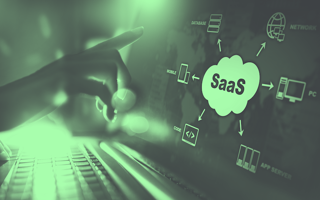Enterprises across all industries are being forced to change how they interact with their customers throughout the entire consumer lifecycle — from initial marketing outreach to product engineering, sales and service efforts.
This acceleration is being driven primarily by consumer demand and technological innovation. People are expecting enterprises to deliver increasingly digital, consumer-friendly experiences across the board, even in more process- and knowledge-intensive industries such as professional and financial services.
The COVID-19 pandemic has only increased this need for digital convenience on the consumers’ end. Enterprises need to leapfrog their investment in digital capabilities, beyond just investing in some AI solutions for specific hotspots like improving customer service. Instead, they need to entirely reimagine their business models to better leverage data-driven AI in a way that delivers exponential value at scale.
SaaSifying Contextual Knowledge
Going forward, enterprises across diverse industry sectors should look to build business models around a cloud-based, “SaaSified” product. Traditionally, these industries sold expertise and relationships, through fixed service contracts according to time and material. By leveraging this contextual data and building an entirely new, platform-driven, SaaS-based product, these businesses will be able to distribute their expertise and services on a much larger scale through new subscription models offering end customers greater choice.
This isn’t to say that consumers don’t still value the interpersonal connection between, say, an advisor and his or her customers. That level of relationship will continue to exist — but in a different form. Those who have the expertise can be leveraged as specialized service professionals to meet individual customer needs as they arise through digital integration on the SaaS platform.
Additionally, the knowledge that these professionals hold is crucial to developing a SaaS product that is up to consumer standards. They should be heavily involved in the development of the initial SaaS product, as well as in post-launch roadmap planning. Consumers are expecting a hybrid model where they are willing to engage for certain components of the overall process on the digital platform and in-person or virtual interactions for specific components. Enterprises who can deliver this hybrid mode of consumption will succeed in the marketplace with better customer engagement that is heavily personalized.
Roadblocks to SaaSification
SaaSification is a long and difficult journey to undertake for enterprises, with different degrees of maturity required in terms of process, people and technology. Understandably, not all enterprises will have the resources needed to adopt a SaaSified business model today.
One of the main hurdles that companies face is the lack of capabilities to build such a model, while also maintaining current operations. Enterprises can’t stop working entirely and shift their focus toward building this product. It’s a process that requires a significant investment of time and resources.
Secondly, many enterprises aren’t as technologically capable as companies in other industries that were built as a direct result of digital innovation. For example, a CRM software provider already has a dedicated team of engineers and developers that are constantly working to update software and create new digital tools for their customer base. Professional services firms, however, don’t have dedicated teams in all the areas required for SaaSification — and that kind of talent is hard to come by.
In addition to having to build and nurture a new dedicated engineering team (which in and of itself is no small feat), enterprises need to find the right talent that will establish an engineering organization and develop a high-quality SaaSified version of the existing product and service offering. Or, perhaps they’ll have to develop a new service as a product offering. Simply put, this requires a team that understands the value of the company at its core. Time to market is key, hence developing an ecosystem-driven model with partners, ISVs, and platform vendors will enable an accelerated and outcome-driven SaaSification roadmap.
How to Get Started
If an enterprise is interested in learning more about the potential for their SaaSification journey, the first thing that they should do is a self-assessment. Ask these questions:
- How strong is the digital infrastructure that you have right now?
- Are you currently investing in developing engineering capabilities?
- Do you have a consolidated view of your contextual knowledge in terms of processes?
- Do you know what data and metadata you have, and do you understand the boundaries of data monetization?
- What is your existing customer experience like?
Beyond this audit of technological integrity, businesses need to think about the core reason why customers choose them over their competitors. These existing differentiators must not be lost in a shift toward SaaSification. Offering a service as a product should not replace an enterprise’s value, but instead should complement and highlight the value that customers are accustomed to. Businesses should not be intimidated by the thought of building an entirely new business model from the ground up, though it’s understandable that a change this significant can make decision makers uneasy.
Ultimately, consumers’ expectations of how they want to receive their products and services are shifting. Enterprises that choose to operate in a business-as-usual mode will end up losing relevance and market share. Early adopters of SaaSification — particularly in industries that rely on process-intensive, contextual knowledge — will find themselves leaps ahead of their competition.





